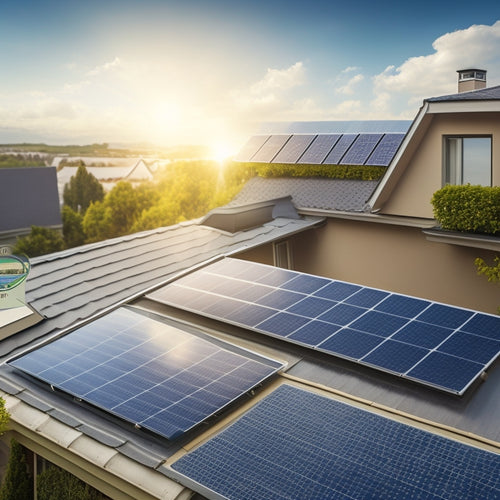
7 Best Financial Incentives for Residential Homeowners
Share
You're entitled to a range of financial incentives that can help offset the costs of owning a home, from federal tax credits to municipal rebates. For instance, you can claim a federal solar panel tax credit of up to 26% of the total cost. Additionally, some states offer tax credits and rebates, such as California's 10% refund up to $10,000. You can also generate revenue by selling excess energy back to the grid and increase your property's value with energy-efficient upgrades. Explore these incentives further to discover how they can greatly impact your bottom line and enhance your homeownership experience.
Key Takeaways
• Federal solar panel tax credit provides up to 26% of total cost as a financial incentive for residential homeowners.
• State-specific incentives, like California's 10% refund up to $10,000, offer additional financial benefits for homeowners.
• Net metering allows homeowners to generate excess energy and sell it back to the grid, providing a new revenue stream.
• Energy-efficient upgrades increase property value, boost curb appeal, and provide financial security through higher resale value.
• Homeowners can earn revenue through selling SRECs, helping to offset the initial investment in renewable energy systems.
Federal Solar Panel Tax Credits
What if you could slash your energy bills and reduce your carbon footprint, all while padding your wallet with some sweet tax credits? If you're considering installing solar panels on your home, you're in luck!
The federal government offers a lucrative incentive to help offset the cost of going solar. As a residential homeowner, you're eligible for the federal solar panel tax credit, which allows you to claim a credit of up to 26% of the total cost of your solar panel system. This credit can be claimed against your federal income taxes, providing a nice reduction in your tax liability.
To be eligible, you must have purchased the solar panel system and have it installed on your primary or secondary residence. The good news is that there's no cap on the credit amount, so the more you spend on your solar panel system, the bigger your credit will be.
State Tax Credits and Rebates
While the federal government's solar panel tax credit provides a substantial incentive, you may also be eligible for additional state tax credits and rebates that can further reduce the cost of going solar.
These state-specific incentives can be noteworthy, with some states offering refunds of up to 10% of the total cost of your solar panel system. For instance, California offers a state refund of 10% of the total cost, up to $10,000. Similarly, New York provides a rebate of $1.75 per watt, up to $15,000.
Additionally, some states exempt a portion of your property taxes, providing local exemptions that can lead to significant savings. You may also be eligible for state tax credits, which can be claimed in addition to the federal tax credit.
Be sure to research the specific incentives available in your state, as they can vary widely. By taking advantage of these state tax credits and rebates, you can notably reduce the upfront cost of going solar and start saving money on your energy bills even sooner.
Net Metering and Excess Energy
As you consider installing renewable energy systems, you'll want to understand how net metering and excess energy can benefit you.
When your system generates more electricity than you're currently using, you can sell the excess back to the grid and offset your energy costs.
In this section, we'll explore how you can maximize your financial gains by generating excess energy and selling it back to the grid.
Generating Excess Energy
By installing a renewable energy system, you can generate more electricity than you need, allowing you to sell the excess back to the grid and offset your energy bills. This is made possible through net metering, which measures the difference between the electricity you produce and the electricity you consume.
When you generate excess energy, you can store it in energy storage systems, such as batteries, for later use or feed it back into the grid. Smart grids play an essential role in facilitating this process, enabling two-way communication between your home and the utility company. This allows for real-time monitoring and management of your energy production and consumption.
With net metering and smart grids, you can maximize your energy independence and reduce your reliance on the grid. By generating excess energy, you can take control of your energy costs and even earn credits or revenue from selling excess energy back to the grid.
Selling Back to Grid
You can cash in on your excess energy by selling it back to the grid through net metering, a policy that allows you to offset your energy bills and even earn credits or revenue. This way, you can reduce your energy costs and increase your savings.
When your renewable energy system produces more energy than you're using, the excess is fed back into the grid and your utility meter runs backwards, giving you credits. You can then use these credits to offset your energy consumption during periods of low energy production.
In areas where Grid Parity has been reached, it's even more beneficial to sell your excess energy back to the grid. You can take advantage of Feed Tariffs, a policy that pays you for the excess energy you produce and feed back into the grid. This way, you can generate revenue from your excess energy and further reduce your energy costs.
Property Value Increase Benefits
In addition, installing energy-efficient upgrades in your home can greatly enhance its market value, making it more appealing to potential buyers if you decide to sell in the future. By investing in energy-efficient features, you'll not only reduce your carbon footprint but also increase your home's resale value.
A well-maintained and energy-efficient home can boost its curb appeal, attracting more potential buyers and driving up its market value. This, in turn, can lead to a significant increase in your home equity, providing you with a sense of financial security and freedom.
Additionally, as your home's value increases, it can contribute to neighborhood growth, making your community a more desirable place to live. With energy-efficient upgrades, you can reap the benefits of a higher resale value, making your home a more attractive investment for potential buyers.
Lower Electricity Bills Guaranteed
Energy-efficient upgrades can slash your electricity bills, guaranteeing significant savings that will put more money back in your pocket. By investing in energy-efficient appliances, insulation, and windows, you can reduce your energy consumption and lower your electricity bills. This means you'll be saving money on your utility bills, which can add up to significant cost savings over time.
In addition to the financial benefits, energy-efficient upgrades can also increase your home's value and appeal. By making your home more energy-efficient, you're not only saving money, but you're also making a valuable investment in your property. According to the U.S. Department of Energy, energy-efficient homes can sell for up to 10% more than similar homes without energy-efficient features.
With energy-efficient upgrades, you can enjoy cost savings, increased property value, and a reduced carbon footprint. It's a win-win for your wallet and the environment. By making the switch to energy-efficient upgrades, you'll be reaping the benefits of lower electricity bills and a more valuable home.
Solar Renewable Energy Certificates
As a homeowner investing in solar energy, you're not only reducing your carbon footprint but also generating a valuable commodity: Solar Renewable Energy Certificates (SRECs).
You'll create one SREC for every 1,000 kilowatt-hours of electricity your system produces, and these certificates can be sold to utilities and companies to help them meet renewable energy requirements.
SREC Generation Process
You generate one SREC for every 1,000 kilowatt-hours (kWh) of electricity your solar panel system produces, making you eligible to sell or trade these certificates in the open market. The SREC generation process is a valuable incentive for residential homeowners who invest in solar energy. As you produce clean energy, you're rewarded with certificates that can be traded for cash.
The value of your SRECs depends on market demand and supply. In states with Renewable Portfolio Standards (RPS), utilities must purchase a certain percentage of their electricity from renewable sources. This drives up SREC pricing, making them more valuable. You can sell your SRECs to these utilities, offsetting your initial investment in solar panels.
Additionally, you're contributing to a carbon offset, reducing the country's reliance on fossil fuels. By generating SRECs, you're not only saving on your energy bills but also playing an essential role in the shift to a cleaner, greener future.
Revenue Potential Explained
With a well-designed solar panel system, homeowners can generate a substantial revenue stream by selling their SRECs, potentially earning hundreds or even thousands of dollars per year. This revenue potential is a significant incentive for homeowners to invest in solar energy. In the world of energy economics, SRECs are a valuable commodity, and homeowners can capitalize on this trend. By understanding the revenue potential of SRECs, you can develop effective investment strategies to maximize your returns.
When you sell your SRECs, you're fundamentally selling the renewable energy attributes of your solar electricity. This creates a new revenue stream that can help offset the initial investment in your solar panel system.
The revenue potential of SRECs depends on several factors, including the size of your solar panel system, the amount of electricity it generates, and the demand for SRECs in your region. By understanding these factors, you can optimize your SREC revenue and make the most of your investment.
With the right strategy, you can turn your solar panel system into a profitable venture that generates a substantial return on investment.
Municipal and Utility Incentives
Municipalities and utility companies offer various financial incentives to encourage residential homeowners to invest in energy-efficient upgrades and renewable energy systems. You can benefit from these incentives, which can greatly reduce the cost of implementing green infrastructure in your home.
For instance, many municipalities offer rebates on water-efficient appliances and fixtures, helping you save on your water bills. Additionally, local permits for renewable energy systems, such as solar panels, may be expedited or discounted, making it easier and more affordable to go green.
Some utility companies also offer community programs that provide discounts on energy-efficient upgrades, such as insulation and windows. By taking advantage of these municipal and utility incentives, you can enjoy substantial savings on your energy bills while reducing your carbon footprint.
Be sure to research the specific incentives available in your area and take advantage of them to maximize your savings.
Frequently Asked Questions
Can I Claim Solar Incentives if I Rent My Property?
As you open the doors to your rental property, you're wondering if you can harness the power of solar incentives. Unfortunately, you can't claim them as a landlord, as rental income's tax implications outweigh the benefits.
Do Solar Incentives Apply to Existing Homes Only?
You'll be happy to know that solar incentives aren't limited to new construction or home renovations - they can be applied to existing homes, too, as long as the solar panel system is new.
Can I Transfer Solar Incentives to a New Homeowner?
When you sell your home, you're likely wondering if you can transfer those enticing solar incentives to the new homeowner. Unfortunately, you'll find that most incentives, like the Federal Solar Investment Tax Credit, aren't transferable.
Are Solar Incentives Available for Second Homes or Vacation Homes?
You're wondering if solar incentives apply to second homes or vacation rentals. Generally, yes, they do, but rules vary; part-time occupation and inheritance rules affect eligibility, so research specific programs for your secondary residence.
Can I Combine Federal and State Solar Incentives?
You can combine federal and state solar incentives, like Sarah in California, who stacked the 30% federal tax credit with her state's rebate, boosting her Solar ROI to 12% and recouping her investment in just 5 years.
Related Posts
-

Electrify Your Short Trips With These 10 Tips
You're about to take your daily short trips to the next level! Whether you're looking to zoom past traffic jams, redu...
-

Understanding Residential Solar Panel Installation Warranties
When you invest in a residential solar panel installation, you expect a comprehensive warranty package that covers th...
-

Why Home Battery Deals Are Worth Buying Online
You're buying a home battery deal online for the same reason you wouldn't buy a car without researching online first....


